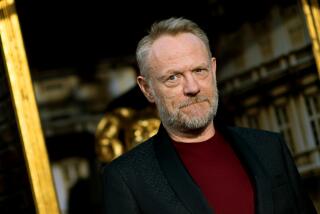An Appreciation: Richard Griffiths’ outstretched hand
- Share via
Richard Griffiths was an actor of enormous size. He was physically big — obese to the point of sometimes needing a cane to get around. But his mind and soul were equally large, and his eloquence was so prodigious that playwright Alan Bennett found in him an ideal interpreter of his magnificently articulate art.
He will live on as Harry Potter’s unsympathetic Uncle Vernon, but I shall remember him for his portrayal of Hector in Bennett’s “The History Boys,” the demanding teacher with the inappropriate hands who tries to instill in his pupils the lasting value of literature.
“The best moments in reading are when you come across something — a thought, a feeling, a way of looking at things — that you’d thought special, particular to you. And here it is, set down by someone else, a person you’ve never met, maybe even someone long dead. And it’s as if a hand has come out and taken yours.”
PHOTOS: Richard Griffiths 1947-2013
When Griffiths spoke these words on the stage of New York’s Broadhurst Theatre, a hush came over the audience. Recognition emanated directly from the actor’s experience to our own. His acting was extending that companionable hand.
Physically, Griffiths was all wrong to play W.H. Auden in Bennett’s “The Habit of Art.” But spiritually he was just right.
His eloquence — it must have been hard-earned, as he was raised by deaf-mute parents and pieced together an education under challenging circumstances — was a triumph of mind over fickle fortune.
And he was generous with his mellifluous voice, sharing the stage with Daniel Radcliffe in “Equus” and guiding him through Peter Shaffer’s play with his magisterial example. His ability to connect language and thought was so masterful that young actors clamored to sign up for the theatrical tutorial.
Griffiths’ eyes had a cherubic twinkle when he graced you with their attention, but he didn’t suffer fools with ringing cellphones gladly. When he was onstage, an offending theatergoer would be publicly brought to task for his crime.
PHOTOS: Celebrities react to the death of Richard Griffiths
He also didn’t appreciate parents demanding that he perform Vernon’s character gratis for their children in the streets of London and New York, and why should he? His annoyance would satisfy them that he was playing the part expressly for their delight.
The truth is he felt that he had been deprived of opportunities as an actor. Deeply respected in the theater, he was nonetheless marginalized by producers for reasons that were only exacerbated by his girth.
In an interview leading up to his eventual Tony Award victory for his performance in “The History Boys,” he shared with me the joy of long-delayed success.
“In 1979, I missed something big and was astonished at how upset I was,” he said. “It was 25 years ago, and since then I was never in the frame. I was nominated for a couple of things, but I had it in my mind that somebody else was bound to get it, which, of course, they did.
“And then, suddenly, ‘The History Boys’ erupted. I don’t know how to describe it. Crescendo is the musical term. It’s like a cornucopia — goodies of nature keep tumbling out. You just wonder how long this thing can last.”
It should have lasted longer. I was looking forward to seeing him reprise his performance opposite Danny DeVito in “The Sunshine Boys” next season at the Ahmanson. But most of all I was eager, as an audience member, to clasp the outstretched hand of this soulful, intelligent performer.
MORE
INTERACTIVE: Christopher Hawthorne’s On the Boulevards
Depictions of violence in theater and more
PHOTOS: Arts and culture in pictures
More to Read
The biggest entertainment stories
Get our big stories about Hollywood, film, television, music, arts, culture and more right in your inbox as soon as they publish.
You may occasionally receive promotional content from the Los Angeles Times.











